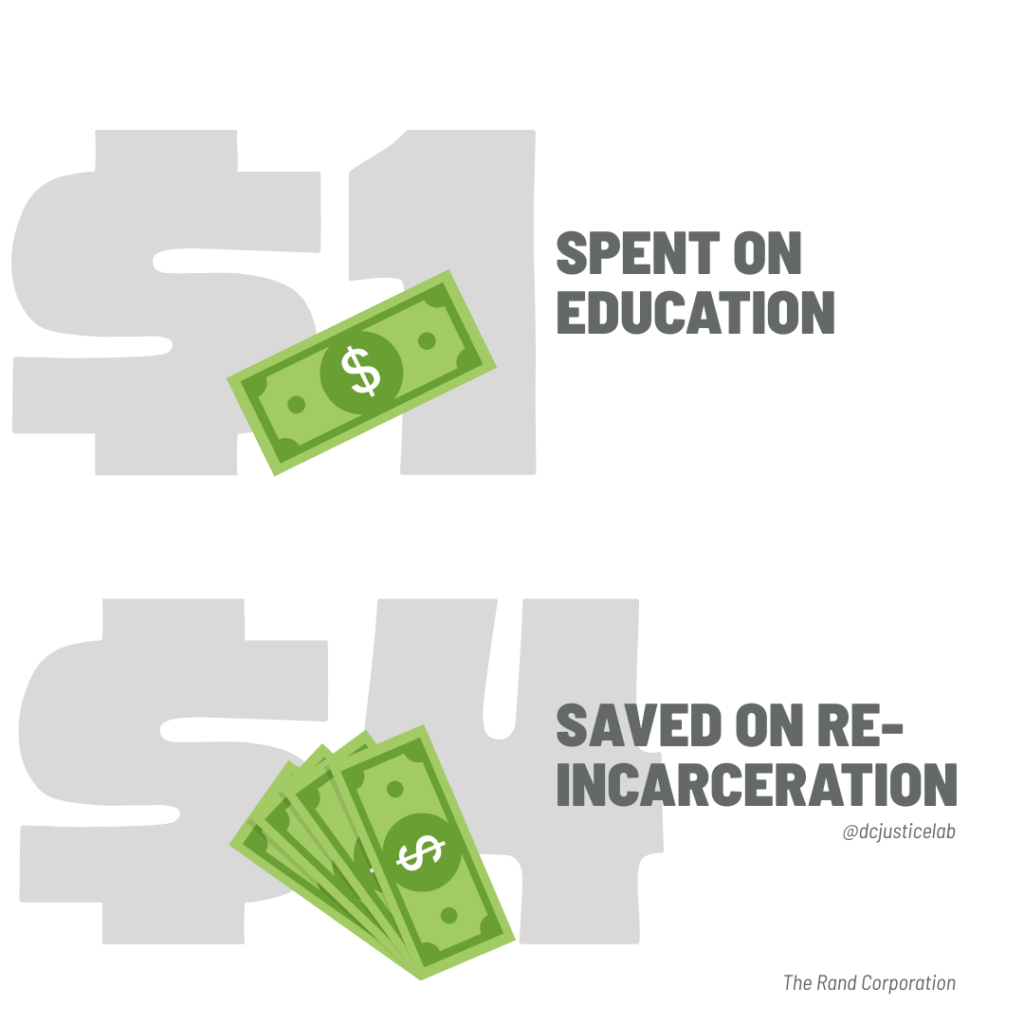
Advocating from DC Jail
If DC Council members can't hear directly from people residing at DC Jail, they can't meaningfully exercise any oversight.
- 7 Minute Read
Unlike most DC residents, the nearly 2,000 DC residents confined to DC Department of Corrections (DOC) facilities are not allowed to advocate for policies by virtually accessing hearings conducted by the Council of the District of Columbia. This disproportionately impacts DC’s Black residents, who represent nearly nine out of 10 people in the jail. While the DOC has stated that there are technological and staffing barriers to allowing residents to engage in this advocacy, the jail is already allowing residents to participate in similar activities and processes in the facility. States like Massachusetts and Washington allow incarcerated people to advocate before legislative bodies. Allowing DC jail residents to advocate in public DC Council hearings virtually would increase oversight over corrections facilities. Since civic engagement is a form of education, it would also reduce recidivism rates, enable residents to maintain community ties, and build real-life skills. DC should introduce and enact legislation that mandates the DOC to allow residents to advocate before the DC Council virtually.

What you need to know
DC residents in the jail do not have the same access as others to advocate before lawmakers.
The Council of the District of Columbia allows residents to testify in-person or virtually through platforms like Zoom. However, the DC jail does not currently permit residents to advocate in this way at hearings before the Council. This issue was on display when, in October 2024, the DOC refused to allow two women who wished to testify by videoconference from the DC jail about how they were treated in custody during pregnancy. Instead, lawyers had to read their written testimony in front of the Council Committee on Judiciary and Public Safety, depriving Councilmembers of the opportunity to hear directly from the two women and ask them questions.
Increasing advocacy from the DC Jail is another way of expanding facility oversight.
Limiting residents of the DC jail to written testimony opportunities prevents the Council of the District of Columbia from more effectively overseeing the jail’s operations and the well-being of its residents. Right now, oversight opportunities in the jail are limited to the once-a-year budget and agency oversight process and the occasional visit by council members to the jail. The Corrections Information Council conducted only nine inspections of DOC facilities in 2024, despite the fact that eighteen people died in DOC custody since 2022. The ability to ask questions of DOC residents during hearings would allow Councilmembers to gain deeper insights and a more comprehensive understanding than what written testimonies alone can provide. Councilmembers and the public would be able to view residents’ perspectives on practices in the jail, ask questions about correctional practices, and hear from residents about whether policies reflect the experiences of incarcerated residents.
The technology exists for expanded advocacy before the DC Council from the jail.
When asked about allowing incarcerated residents to participate in DC Council hearings virtually, the Director of the Department of Corrections said the facility “lacks the technological capacity” due to “very limited WiFi connectivity.” However, in other contexts, people in jail are able to connect with individuals outside the facility through the same technology. During the COVID-19 pandemic, people in the jail, as well as judges, defense counsel, and police, were able to participate in court hearings virtually. Since 2020, people who are residents in the DC jail have elected their own Advisory Neighborhood Commissioner (ANC) – an elected official who uses tablets in the jail to engage with DC officials and community organizations. As Advisory Neighborhood Commissioner Shamika Hayes said during a virtual meeting with people outside the jail, “We have the technology: I’m using it now.”
“We have the technology: I'm using it now.”
-- Shameka Hayes
The DC jail has the staffing capacity to allow for advocacy from facility residents.
The Director of the DOC has stated that they lack the“staffing involvement and oversight” required to facilitate advocacy from DC residents before the Council of the District of Columbia. Yet, a social worker who has worked in the DC jail has said that current case managers in the facility have access to virtual meeting platforms and are responsible for ensuring residents have access to their attorneys. The social worker made clear that “just as case managers schedule time to facilitate phone calls for their clients, they can schedule for their clients to participate in Council hearings.” In the Central Detention Facility, according to the social worker, residents are currently able to “travel to the visitation hall or other areas of the jail with a pass and without escort…if a resident needs to move from the unit to another area to participate in a hearing, they will be able to do so on their own, and no staff will be needed.”
There are other places where incarcerated residents can advocate before legislators.
Incarcerated individuals are accessing legislative processes in other jurisdictions. In Massachusetts, twenty incarcerated women testified via Zoom in 2023 in opposition to a proposal for a $50 million dollar prison expansion. In Washington state, incarcerated individuals have testified virtually before legislative bodies for seven years, even before the pandemic, with 18 out of 32 requests granted in 2024 and a state requirement for three incarcerated people to testify at each legislative committee hearing.
Creating ways to advocate before legislators from the jail can increase safety and accountability.
Advocacy before the Council of the District of Columbia is a form of civic participation and an educational opportunity: the process requires a resident to learn about governmental processes, specialized legislative terminology, and effective advocacy strategies. Because civic engagement is a form of education, increasing access to advocacy opportunities would likely reduce recidivism rates and build residents’ real-world skills. One study shows that every dollar spent on prison education saves four to five dollars on the costs of re-incarceration. Civic participation in correctional facilities would equip people in the jail with practical skills and empower residents with a sense of purpose. An organization based in Washington state that is led by individuals in prison or people recently released from prison says, “peer-led civic education… empowers directly impacted people with the skills and knowledge to navigate legislative and policy change so that they may advocate on their behalf.” International experts say civic engagement increases accountability. Even conservatives acknowledge that civic participation can save individuals from “alienation and hopelessness.”
Preventing access to lawmakers from the jail disproportionately impacts Black people.
There have been policy efforts to remove barriers to civic participation for Black people throughout American history, including the removal of literacy test requirements to vote, efforts to limit changes to voter requirements, the elimination of gerrymandering practices, and the removal of poll taxes. Black residents make up 44 percent of DC’s population, yet 88 percent of residents in the DC jail are Black. Eliminating barriers to virtual access to DC Council hearings will reduce impediments to civic participation that currently almost exclusively affect Black residents of DC.
There is legislation that requires the DOC to allow residents to advocate from the DC jail.
The DC DOC could independently implement a policy allowing residents of the jail to advocate before the Council of the District of Columbia but has consistently chosen not to. A working group of organizations that includes the DC Justice Lab, the Washington Lawyers Committee on Civil For Civil Rights and Urban Affairs, the Public Defender Service of the District of Columbia, Wiley Rein LLP, and the Georgetown Law School Abolition Advocacy Project has drafted legislation to address this issue. The legislation would create pathways so that an incarcerated individual can testify before the DC Council by video technology, such as Zoom and WebEx, or by phone and written submissions. The DOC would be required to supply electronic devices, internet access, and free legal mail to residents. The legislation would guarantee, as a right, that people in jail can communicate with their ANC Commissioner through virtual meetings and town halls. The bill prohibits DOC staff from monitoring confidential testimony and guarantees access to legal counsel. Additionally, the DOC would be mandated to track denied requests to access hearings and grievances about the process and report on the implementation of the bill. This model legislation is ready to be introduced by members of the Council of the District of Columbia.

WHERE TO LEARN MORE
Prison Journalism Project September 2024
Georgetown University Prison and Justice Initiative April 2024
Prison Policy Initiative April 2025
GBH – Boston Television June 2023
The National Review May 2024
Our Solutions
DC should:
- Introduce and enact legislation that mandates the Department of Corrections to allow residents of the DC Jail to advocate before the Council of the District of Columbia virtually
- Develop programs in the jail to educate residents about legislative processes and support skill development around advocacy and civic participation
- Expand the Advisory Neighborhood Commissioner role, scope and ability to facilitate civic engagement and advocacy opportunities within DOC facilities
special thanks
Stacey Litner ★ Caitlin Holbrook ★ Brittany Vazquez ★ April Song ★ Claire Stalder ★ Micheal Woody ★ Shamika Hayes ★ Rafael Andino ★ Julia Weil


